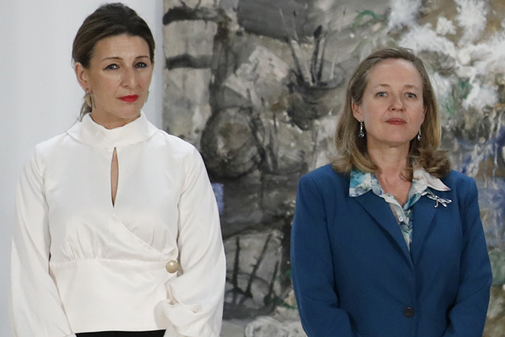- The Constitutional endorses dismissals for repeated absenteeism even if there are justified causes
The agenda of the Government project to turn around the labor reform is moving at a much lower rate than that foreseen by the Ministry of Labor.
The immediacy and the roundness of the measures announced by Labor marry badly with the nuances that Nadia Calviño introduces from Economy. The plan drawn from Work by Yolanda Díaz in which it is one of the main axes of this legislature is a "dismantling" from less to more in degree of difficulty with three phases: repeal of dismissal for justified casualties; more harmful aspects of labor reform and, finally, the core of the framework, such as layoffs.
But the commitment to go through the social dialogue table in search of agreements with businessmen and the procedures to reach the firm in the Council of Ministers delay the pace . "We want to strengthen this social dialogue to ensure that any reform is balanced, does not harm job creation and will last for a number of years," Calviño recalled yesterday in an interview published in the Financial Times. The head of Economy met with international investors in London to clarify the Government's lines in economic matters.
It happened with the Minimum Interprofessional Salary (SMI), which went ahead with some delay and a substantial reduction with respect to the commitments of United Odes. And yesterday coincided with the repeal of article 52 d of the Statute of Workers that supports the dismissal with justified casualties and was scheduled for today.
Labor denied yesterday that the delay in the approval of the measure is due to differences within the Government. "It must comply with a new consultation process this week but it will surely be repealed on February 18," they say in the ministry led by Díaz. The Secretary of State for Employment, Joaquín Pérez Rey , already met last week with employers and unions to present a proposal that in the coming days will be validated by the commission of secretaries of State.
All sources consulted indicate that the dismissal for lack of assistance to work, even justified but in a sufficient calculation, will be suppressed without being partially or totally replaced by another text . That is, after the approval of the Royal Decree that repeals it, this type of dismissals will not be based on objective causes and will go from being inadmissible, with the corresponding change in the days of compensation per year worked, which will exceed 20 days per year worked and a maximum of 12 monthly payments to 33 days.
Calviño itself has approved the measure by ensuring that there is a great consensus around the derogation and consulted labor offices maintain that the effect on companies is minimal. UGT, CCOO, CEOE and Cepyme have since last week a draft with the proposal, which in the explanatory statement of the Royal Decree tries to legally shield the reasons for urgency of the repeal for the violation of the constitutional right to health, if Well, the text they delete has several years in force. Since in October 2019 the Constitutional Court endorsed this type of dismissals, the unions have indicated the great division that existed within the high court at the time of issuing the sentence and have marked the suppression of the article as a red line of in the face of subsequent negotiations. "The business interest, whatever the type, cannot be legitimized through measures contrary to the constitutional rights of workers," union sources said, citing the particular vote of a magistrate.
Sources present in the social dialogue said yesterday that the repeal will proceed with or without the support of the employer, since the consultation process has been carried out and there is no obligation to adopt a unanimous decision , as was the last rise of the SMI. With the reformist agenda of Díaz and the nuances of Calviño, the suppression of article 52 d of the Workers' Statute will mean leaving behind a stage to take conversations with employers and unions to a new phase where agreements to reform labor legislation will be increasingly more difficult to reach, inside and outside the Government.
According to the criteria of The Trust Project
Know more
